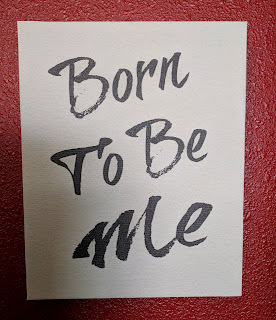It's Time to Talk Back
 |
| Hangs on my office wall to remind me there's no shame in being me! |
I heard those words so often growing up that they still reverberate through my head far too often. They were a common admonishment when I wanted to make my point, defend myself, state my case, or otherwise get myself out of trouble . I was convinced that if I could just explain my side, I could show that I didn't deserve to be in trouble. I wasn't trying to "sass" or be disrespectful as was so often thought.
I never understood why I couldn't present my side of things yet I eventually accepted the reality that sometimes my side of it didn't change things. Sometimes because I'd done the wrong thing even if I thought it was for the right reasons and sometimes because no one wanted to hear my side of things or cared why I did what I did that got me in trouble.
It's strange how that message can become so ingrained that one doesn't even dare talk back to one's self even when one's self is spewing downright cruel self-talk, particularly the self-talk born from the criticism or admonishment one received about wrongdoing.
Brené Brown talks about the difference in shame and blame in her work. Her research defines shame as "I am bad" and blame as "I did something bad." This might seem like an over-generalization, but that's the gist of it. When I first studied her work, I thought "I don't live in shame. Yay me!!"
Then... oh, there's always a then. I was sitting at my desk after making some silly mistake and I started listening, really listening, to my self talk. Not in the internalization-that-made-me-feel-bad-about-myself way but in the okay-what-am-I-really-saying-to-myself way. And there it was. My self-talk was full of... I am bad... I am every bad thing in the book. I am all those horrible things everyone has ever said about me. I am... Boom!! I saw the shame like a dark cloud gathering. I heard shame screaming at me. I could almost smell the shame. I could taste the shame in my mouth like a bitter pill dissolving on my tongue. I felt the shame like a punch in the gut.
And I thought... Oh, this is what Brené was talking about.
I took each shame thought and examined it, analyzed it as it arose. Asked myself if it was true. Then I looked at why each shame thought existed. For some, the answer was easy. For some, it was quite difficult. For others, I'm still not sure.
But right then, I replied to each shame thought with an "okay, so what did I do that was bad?" and tried to change the language immediately to match the action. When I saw that I did something bad, I would address it. I could see the why or the how. I could see the action to take to correct it or to make amends. I could see so much farther than "I am bad therefore I am worthless and unlovable." Yet, every time I tried to address this I heard that little voice pop up. "Don't talk back."
"Don't talk back." was keeping me in shame. I needed to find a way to stop the cycle.
I had to fight that little voice telling me not to talk back, to not stand up for myself, to take my punishment because I deserve it even if my mistake or bad deed was unintentional and even after it was already forgiven by the other party.
"Don't talk back." kept me in shame.
Finally one day, I took a bold step. I gave myself permission to talk back to the voices in my head admonishing me and keeping me in shame. I gave myself permission to stand up for myself even when that meant standing up to myself. I gave myself permission to make mistakes, own them, and not punish myself for hours, days, weeks, months, sometimes even years long after no one else even remembered the incident.
While it's been liberating to talk back to the shaming language, I still struggle with the "Don't talk back." narrative in my mind. I'm getting better at it though.
When those nasty voices pop up that tell you you aren't good enough, talk back to them. Tell them what you wish you could've told every person who ever shamed you into doubting yourself, even if they did it in the name of love or education or helpfulness. Shame isn't love.
Learning accountability is about learning to see the difference in shame and blame. When you can hold yourself accountable without punishing yourself for who you are, you're on your way to telling those shaming voices in your head that get in the way of progress to shut up and go away.
It's time! It's past time! Talk back!


Comments
Post a Comment